Part 2 Brink of glory - Results
and table
Herbert Chapman's appointment as
secretary manager of Leeds City in 1912 breathed
life into an ailing club. He led their re-election campaign, then steered
them to sixth place in the Second Division,
equalling their best ever finish.
The team struggled for consistency, but showed enough moments
of class to hint that Chapman's promise of promotion was not an
empty one.
By and large, the manager was content with the first team, but knew he
needed to improve the pool's depth. He commenced the transformation of
his squad by dispensing with the services of long-serving Stan Cubberley,
Tom Morris and Hugh Roberts (with nearly 400 league games between them
for City), along with Jimmy Robertson, one of his initial signings. The
summer of 1913 saw the departure of several fringe players, including
Joe Moran, Jock Ferguson, Andy Gibson, Harry Bridgett, George Fenwick,
Tom Broughton and George Cunningham. Irishman Joe Enright followed them
out of Elland Road in October.
By the end of September, a number of new men had signed up, mainly from
junior clubs: Tommy Lamph, Spennymoor, half-back; John Dunn, Eccles Borough,
full-back; Manus Divers, Cambuslang Rovers, left-back; David Davidson,
Third Lanark, centre-forward; John McDonald, Croy Athletic, outside-right;
Webb Richardson, Barnet and Alston, outside-right; James Johnson, Bedlington
United, inside-right; and Neil Turner, Petershill, outside-right.
Four other recruits merited special mention.
19-year-old full-back Albert Urwin signed professional forms
for City, rejecting overtures from Sheffield United, Middlesbrough,
Bristol City and Tottenham, all of the First Division. Urwin had
played in the South Bank side that won the West Riding Junior
Cup in 1912 and the Amateur Cup the following year. His signing
was evidence of Chapman's drawing power.
Chapman signed two centre-halves: the rugged Jack Hampson, a
future City captain, renewed his acquaintance with a man who had
managed him at Northampton, while Harry Peart agreed to drop a
division when leaving Bradford City.
The prize capture, though, was left winger Ivan Sharpe, 24. He
won a gold medal with Great Britain at the Olympics in 1912 and
still retained his amateur status. He worked as a professional
football journalist and had played football with local clubs while
working with newspapers in St Albans, Watford, Glossop and Derby.
In 1912 he helped the Rams win the Second Division title with
his wonderful centres to the goalscoring legend, Steve Bloomer.
When Sharpe started working for the Yorkshire Evening News in
the summer he was happy to make himself available for City.
The Chapman revolution was gathering pace and attracting interest.
For the most part, it was Chapman's team playing in Chapman's
way that served City through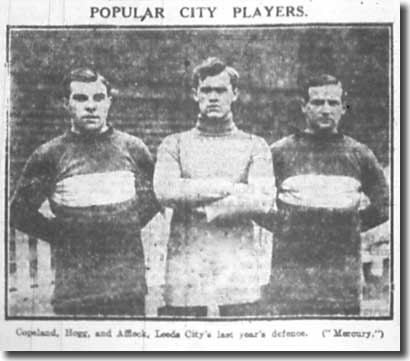 the season. Tony Hogg, George Affleck, Mick Foley and Billy McLeod
were links with earlier regimes, but the rest of the side were
Chapman signings. Fred Croot made a handful of appearances, but
he was forced to play second fiddle to Sharpe.
the season. Tony Hogg, George Affleck, Mick Foley and Billy McLeod
were links with earlier regimes, but the rest of the side were
Chapman signings. Fred Croot made a handful of appearances, but
he was forced to play second fiddle to Sharpe.
City supporters were optimistic as the campaign kicked off on
6 September 1913 with a home fixture against Glossop. Interest
in the club had soared to such an extent that £2,000-worth of
season tickets had been sold. Attendances had picked up the previous
season, averaging a club record 13,356, and in 1913/14 soared
to almost 17,000.
back to top
Hampson and Sharpe were given debuts at centre-half and outside-left
respectively, but otherwise it was the same eleven that had gone largely
unchanged through the spring: Hogg continued to be preferred to the experienced
Billy Scott, while Charlie Copeland and Affleck renewed their full-back
partnership. George Law was omitted to allow skipper Evelyn Lintott to
shift to right-half with Irishman Foley completing the middle trio. The
Yorkshire Post promised that, 'If Hampson realises expectations
there should be the best half-back line the City have had for some years,
for Foley made great strides towards the end of last season.' Among the
forwards, Croot made way for Sharpe, but Simpson Bainbridge, Arthur Price,
McLeod and Jimmy Speirs remained in situ.
City fulfilled all expectations against Glossop with a 3-0 victory, thanks
to goals from Speirs and McLeod (2), though the Post counselled
that 'it would be folly to build up hopes of promotion upon that one achievement.'
The home men dominated the first half, though they had to be
content with a single goal from Speirs, nodded home from a smart
lob from Sharpe. There should have been more, with Price missing
badly and then hitting an upright, but Glossop enjoyed prolonged
periods of pressure after the interval and came close to equalising.
City made the points secure, though, with two goals in five minutes
by McLeod.
Hampson was handicapped from early on with blood pouring out of an eye
cut in a clash with Glossop's Moore. The Post complained: 'Much
was hoped for from the introduction of Hampson, ... but, as things were,
the half-back play of the team was sadly disappointing ... It is still
matter for doubt whether he has qualifications which justify his displacement
of Lintott ... The latter, though always preferred at left-half in his
Bradford City days, has played so long in the centre as to have become
unfitted for any other position, and on Saturday he was so completely
out of his element as to become ineffective ... Criticism of the front
line in general may be silenced by the flashes of brilliance which they
have on occasion offered, and by the evidence of distinctive merit in
the performance given by the amateur international Ivan Sharpe. With Sharpe
as the left wing partner to Speirs, supporters of the club may hope that
the City's attack will be brought up to a standard of excellence, which
it has never previously attained.'
City could not capitalise on that start and were defeated at
Stockport. They went ahead when Price headed home a beautiful
centre from Sharpe, but the Derbyshire men scored twice in the
last twenty minutes to secure the 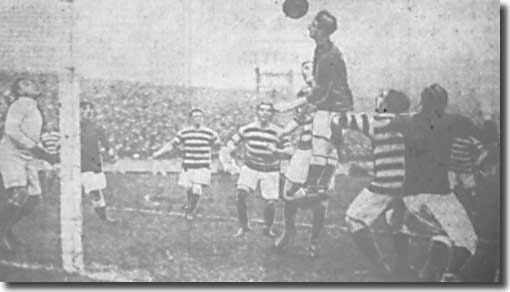 points.
points.
The Peacocks' form fluctuated erratically.
An ankle injury for Lintott gave Law the chance to come back at right-half
and City thrashed undefeated Bradford Park Avenue 5-1 on September 20
with goals from Speirs, McLeod, Bainbridge (2) and Price. JRB enthused
in the Leeds Mercury that 'I have witnessed many games at Elland
Road, but I do not think I have seen a better League game than that of
Saturday.' A week later, the same eleven were hammered 4-0 by Notts County.
It was generally reckoned that the score flattered Notts, as Yorkist
reported in the Mercury. 'It must not be imagined they had a runaway
victory. They scored twice in each half of the game, but it was only in
the last fifteen minutes of each half that they got their goals, and there
is not the least doubt that it was the manner in which they got their
first goal that paved the way to their success.
'There was nothing to choose between the teams till the fateful goal
came after half an hour's play. Bassett, the County outside-right, was
in possession of the ball when he was bowled over by Hampson just inches
inside the penalty area. It was a perfectly fair charge, but the referee
thought otherwise, and, to the consternation of the Leeds players and
their coterie of followers, he awarded a penalty, and Richards scored
with a shot which hit the crossbar before entering the net.
'The referee was Mr J Pearson of Dudley, and it is no exaggeration to
say that not one referee in twenty would have taken the view he did. All
the pressmen ... were astonished at the decision of the referee in awarding
a penalty ... Apart from this instance, Mr Pearson did not please by his
handling of the game, as several of his callings were rather curious.
'The Leeds City players also strongly appealed against the third goal
scored by Flint twelve minutes from time, on the ground that the County
inside-right was offside, and the referee consulted first one linesman
and then the other before confirming his decision. In fairness to Mr Pearson,
however, it should be said that from the press seats this seemed a perfectly
fair goal.'
City won three of the four games played in October. The other brought
an inexplicable 2-1 defeat at home to Hull on the 18th of the month, but
a week later they bounced back. The Evening Post: 'No result was
so totally unexpected as that in which Leeds City inflicted upon Barnsley
their first defeat of the season ... What a baffling business is the form
of the Leeds City team. One week they win at Wolverhampton, the next week
they slipped up at home before a very weak Hull City team, only to recover
themselves again and startle the football world by running away with Barnsley
to the extent of 4-1.
'Speirs, the City captain, was the best man on the field, and at a time
when there is an agitation for the reinstatement of Lintott at centre-half,
it is singular to have to report that the next best contributor to Leeds
City's success was Hampson, who seldom went for the ball without securing
it.'
The Yorkshire Post remarked on the part played by Speirs in guiding
his men to victory: 'A change of tactics, organised by Speirs, enabled
Leeds City in the end to win hands down. The winners played two distinct
styles of football in the course of the game. They played Barnsley at
their own game in the first half, and scored their first goal by means
of long swinging passes from wing to wing, but it was in the deftness
with which Speirs, McLeod and Price practised the short passing game that
they excelled.
back to top
'Speirs was the best on the field. It is no more than his due to say
that it was his individual 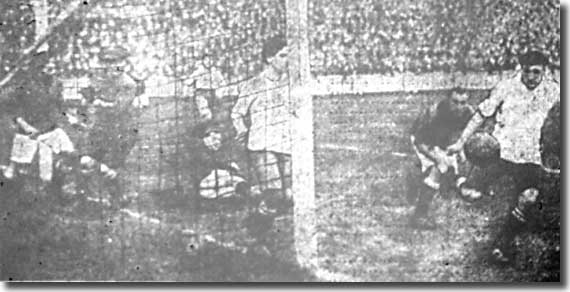 cleverness,
and genuine leadership, which brought triumph to his side.'
cleverness,
and genuine leadership, which brought triumph to his side.'
By the beginning of November, City had already lost three times, but
had won enough matches to be fifth. The latest victory, on 1 November,
came against leaders Bury. First half goals by Price and Speirs brought
a deserved half time lead. Leeds had to fight hard to preserve their advantage
after Peake pulled a goal back midway through the second half, but they
did so safely enough.
A goal from debutant Neil Turner gave City the lead away to Huddersfield
a week later, but Town equalised at the start of the second half
and the game finished in a draw.
The Leeds Mercury reported, 'With Ivan Sharpe, Bainbridge and
Copeland out of the team, it would have been no surprise if Leeds City
had suffered defeat at Leeds Road ... Had either side won, the losers
would have been thoroughly justified in lodging a protest, for the game
was finished in darkness, and the surprising thing is that it was played
to a finish. A mistake was made to begin with in fixing the time of starting
for three o'clock, and to make matters worse, heavy rain and a thick mist
prevailed practically all the afternoon. Even when Mr Pearson started
the game several minutes before three, it looked odds against full time
being played. In the last quarter of an hour it was impossible to see
the ball or distinguish players from the stand, and the evening paper
reporters had to light matches to get their copy finished.'
McLeod's late header was enough to beat Lincoln City at Elland Road on
15 November and Leeds were unlucky to return from a trip to Blackpool
a week later with only a 2-2 draw.
The Seasiders opened the scoring from a controversial penalty. The Leeds
Mercury: 'Why was the penalty kick given against Leeds City? Everyone
was asking the question ... The referee's explanation is, I believe, that
Affleck butted, or attempted to butt, a man in the back, but what grounds
he had for coming to this decision appears to be known to himself alone.
Of course, the referee is in a better position to see things than the
spectators, but not one solitary supporter of the Blackpool team did I
hear express the opinion that there had been any infringement.'
City were twice behind and had to show fighting spirit to earn
the draw, the goals from Hampson and Croot coming from spectacular
drives.
Billy McLeod enhanced his reputation with a spectacular display against
lowly Nottingham Forest on 29 November. McLeod struck four times as City
ran riot, achieving a record 8-0 victory that left them in third place.
The following week, the Peacocks faced a difficult trip to Woolwich
Arsenal. The Gunners had been relegated from the First Division
at the end of the previous season and were intent on an immediate
return. They were a couple of places below City in the table,
though still trying to recover from a 6-1 mauling at Fulham on
8 November.
The Arsenal had just relocated to Highbury Stadium and it was a first
visit to the scene for Herbert Chapman. 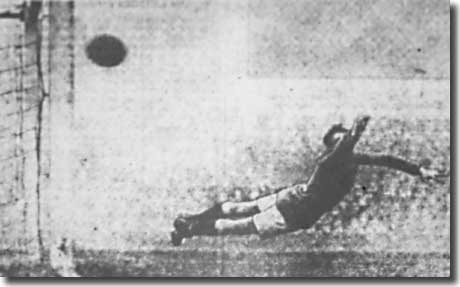 Stephen
Studd: 'When Leeds City arrived for their meeting with the Gunners on
6 December 1913, the Highbury ground was still only half finished, and
a wooden stand on the east side, designed for 9,000 spectators, was still
being built. Chapman was particularly struck by the fact that the ground
was just across the road from Gillespie Road Underground station, and
could thus be reached easily from most parts of London. This observation
was to bear fruit in later years.'
Stephen
Studd: 'When Leeds City arrived for their meeting with the Gunners on
6 December 1913, the Highbury ground was still only half finished, and
a wooden stand on the east side, designed for 9,000 spectators, was still
being built. Chapman was particularly struck by the fact that the ground
was just across the road from Gillespie Road Underground station, and
could thus be reached easily from most parts of London. This observation
was to bear fruit in later years.'
City understandably stuck by the eleven that did so well against
Forest, persisting with their experiment of using Arthur Price
and Jimmy Speirs in unaccustomed positions.
back to top
The game, watched by almost 20,000 spectators, kicked off at
2.30 and there was a suspicion that the inclement weather might
lead to play being concluded in darkness.
Speirs won the toss and City began the game the stronger. They
went about their work with a will and forced four corners in the
first ten minutes. They couldn't convert any of them but certainly
caused Arsenal keeper Lievesley some moments of high anxiety.
Shortly afterwards, though, the home men had a goal disallowed. Referee
J E Hall of Birmingham had whistled for a foul against the Peacocks, just
as Arsenal inside-right Hardinge hammered the ball past Tony Hogg. The
referee, amidst a 'chorus of hooting', disallowed the goal and ordered
a free kick for a foul by City earlier in the movement. Hardinge wasted
the opportunity, firing the ball wildly over the bar.
Both teams had opportunities, though neither could open the scoring.
Bainbridge had aggravated a recent injury and was a limping passenger
as the game reached its interval.
The Arsenal wingers, Rutherford and Lewis, troubled the City
defence in the second half and the decisive moment came after
one raid by the latter. Referee Hall decided that Charlie Copeland
had deliberately tripped the winger and awarded a penalty, though
the decision was hotly disputed by the City players. When the
protests had subsided, full-back Benson hammered the spot kick
past Hogg, though the keeper managed to get his hand to the effort.
The goal drove the home side on to greater efforts and they pressed
City hotly after that, though they could not add to their total.
Leeds rallied toward the end of the match without hinting at an
equaliser.
Cockney in the Leeds Mercury wrote, 'On the general run of play
they had been quite the equal of their opponents in points of skill, and
a goalless draw would have much better represented the teams.
'It was a hard game from beginning to end, and one of the best features
of the play was the remarkable pace that was maintained. The forwards,
it is true, failed to make the most of many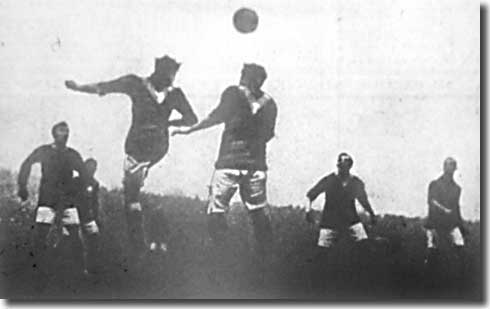 fine opportunities that were given them in front of goal. That was their
only fault, however, and it is seldom that such fine, open attacking is
so unsuccessful. There was no great attempt to combine by either line
of forwards ... Nothing tangible happened simply because the play of the
full-backs was of such a vigorous character that an incoming forward was
bundled off the ball without ceremony, and what they failed to accomplish,
the goalkeepers, Lievesley and Hogg, did in a convincing manner.
fine opportunities that were given them in front of goal. That was their
only fault, however, and it is seldom that such fine, open attacking is
so unsuccessful. There was no great attempt to combine by either line
of forwards ... Nothing tangible happened simply because the play of the
full-backs was of such a vigorous character that an incoming forward was
bundled off the ball without ceremony, and what they failed to accomplish,
the goalkeepers, Lievesley and Hogg, did in a convincing manner.
'One of the best efforts in the first half came from the visitors, and
it was Bainbridge who made the running. He directed his centre admirably,
and Price fired in a powerful shot that was magnificently saved by Lievesley.
That was the nearest approach to scoring accomplished by the City, although
they made many other fine attempts.
'The City showed better form than the Arsenal, but the play of the home
inside-forwards was certainly more convincing than the Leeds trio, of
which Speirs was the best. McLeod was always a great worker, but he was
closely shadowed by Sands, who was none too particular in which way he
stopped the City's pivot.
'If we were to judge the teams by the form which they showed on Saturday,
it is easy to fancy either for a high place in the League table, and the
promotion prospects seem decidedly promising.'
The Speirs-Price experiment was proclaimed a failure; before the home
game with Grimsby, the Mercury reported, 'The City directors have
deemed it expedient to rearrange the forward line. Speirs goes from inside-right
to his old place at inside-left as partner to Ivan Sharpe, and this should
be an improvement. It seems a pity that the Speirs-Sharpe partnership
was ever disturbed.' John Johnson was given his debut in place of the
injured Bainbridge, and it was reported that he played well.
The numbers attending were impacted adversely by an early start
and a tram service restricted by a strike by Leeds municipal employees,
though there was still a goodly crowd. City played into a strong
wind but created a hatful of opportunities, all of which went
to waste. Quin gave Grimsby a half time lead with a farcical goal.
Hogg stopped a shot from Gregson, but when Affleck tried to hammer
the ball clear it struck Quin in the chest and rebounded into
the net.
City's paucity owed something to the lengthy absence of Jack
Hampson, who went off with a leg injury. When he returned he had
still not fully recovered.
City adapted their tactics for the second period and found fresh
vigour. Within twelve minutes of the restart McLeod equalised
after receiving a well judged pass from Hampson. A minute later
the centre-half gave them the lead and McLeod added his second
after a further sixty seconds. It was remarkable that even when
so hampered, Hampson was involved in the game's vital moments.
There was an understandable lull for a while thereafter with
Hampson going to outside-right because of his injury. Johnson
moved to inside-left and Speirs filled in at centre-half. Before
the end Price ran in a 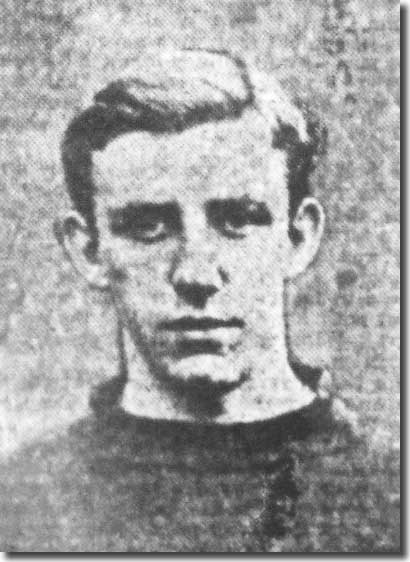 fourth
goal to complete an emphatic victory.
fourth
goal to complete an emphatic victory.
back to top
It was already absolutely clear that Herbert Chapman had found
a rare combination in Jimmy Speirs and Ivan Sharpe. They were
two individual gems who as a pairing made the left flank a source
of real quality. Countless goals had stemmed from the centres
of Sharpe and the intelligent scheming of Speirs.
Their quality, however, put the displays of the other wing into
stark relief. 18-year-old Simpson Bainbridge was the baby of the
side, and though he possessed an abundance of skill and talent,
his contributions were constrained by his inexperience, a lack
of application leading to inconsistency. His performances veered
wildly from the brilliant to the mundane, often in the space of
a single 90 minutes. It was a cause for some dissatisfaction and
his inside-forward partner, Arthur Price, had neither the guile
nor the craft to coax the best out of the wide man.
As the Yorkshire Post reported in October, "In Speirs and Ivan
Sharpe Leeds have the best left wing pair they have ever possessed;
on the right wing Price and Bainbridge are not developing as fully
as their earlier promise led one to expect. It is easy, of course,
to point out weaknesses; the means of remedying them is quite
another matter. Money will have to be laid down but with the great
possibilities before League football in Leeds, it may with confidence
be stated that such money well spent will prove a good investment."
One option available to Herbert Chapman was to switch Sharpe
to the right wing and draft Fred Croot in on the left, but even
though the amateur could play on the right, he was never as comfortable,
productive or incisive as he was in his customary berth.
It was a real conundrum for the manager.
By the time of the following game, away to Birmingham on December
20, Chapman had an alternative at his disposal. City, while still
suffering financial difficulties, had regular money coming in
via healthy takings at the turnstiles and Chapman persuaded receiver
Tom Coombs to free up some funds. £1,000 was found for the
signature of the 23-year-old Scottish inside-right, John Jackson,
from Clyde. The Leeds Mercury described Jackson as "a player who
was in considerable demand recently, several First League clubs
being anxious to induce him to put his name to a document on their
behalf."
Jackson went straight into the team, starting at inside-right
with Price outside him at Birmingham, while Evelyn Lintott was
recalled at centre-half to deputise for Hampson.
According to the Mercury, Jackson 'was not an overpowering success,
but that was largely due to the fact ... that he suffered from being insufficiently
fed. Very few openings were made for him, in fact, and he did not get
many chances of shining. Neither did he show conspicuous ability in making
his own openings; but then he was new to the side, and too much cannot
be expected from a man in a strange environment. Jackson did some smart
things towards the close, and he showed that he can manipulate the ball;
he must at least have a good trial before one's mind can be made up as
to whether he is going to be a striking success or not.'
The Yorkshire Evening Post reported, 'Jackson could not be expected
to settle down to the robustness of English League football all in a moment,
and possibly he suffered on Saturday from a want of understanding on the
part of Price, who was to some extent at sea in the unaccustomed position
as winger. Presuming that Jackson and Price will be played together for
a time as the right wing pair, there is promise of good results in their
association, and that is the most that one is justified in saying at this
juncture. The other wing, upheld by Speirs and Ivan Sharpe, was undoubtedly
the more effective, and whilst speaking of Speirs as the most 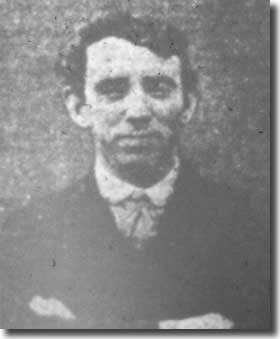 successful
schemer of the match, it will be pleasing to Sharpe's friends to know
that the goal which he scored was the crowning point of an excellent afternoon's
work.'
successful
schemer of the match, it will be pleasing to Sharpe's friends to know
that the goal which he scored was the crowning point of an excellent afternoon's
work.'
Birmingham's customary inability to convert possession into goals
was clearly in evidence; in contrast, City were clinical. McLeod
opened the scoring from a fine centre by Price and then Sharpe
seized on another Price cross to net the second with the Midlanders
unable to find even a consolation score.
Those goals left City as the division's leading scorers, a status
consolidated on Christmas Day when they beat Fulham 2-1 at Elland
Road. The victory took them up to third, two points behind leaders
Notts County, as Bradford Park Avenue surrendered second spot
after losing 3-2 at home to Woolwich Arsenal. Hull City remained
very much in the mix with a 3-0 victory at Huddersfield.
Elland Road was heaving for the Fulham fixture. The Yorkshire Post
reported, 'A big holiday crowd assembled, the stand accommodation
for once being totally inadequate for the number of persons wishing to
avail themselves of the same, and it was computed that close upon 30,000
spectators must have been present. Many witnessed the play from difficult
positions, while some saw but little of the game. All present, however,
took the situation in good part, and although the railings gave way in
one portion of the field, the match was carried through without interruption.'
back to top
Ivan Sharpe had a field day, his 'runs and centres from the left wing
being very telling and gratifying to a large portion of the crowd'. It
was one of the winger's crosses that led to the opening goal after twenty-two
minutes. Billy McLeod set off on a run but when he was blocked off by
Fulham defenders he fed Sharpe on the flank. Speirs missed the chance
when the cross came over, but it reached Price on the other wing and McLeod
slipped the ball into an empty net when the ball was sent back in.
Five minutes before the break City went further ahead. They forced
a series of corners and Hampson scored from one as he tumbled
to the floor.
Just before the half time whistle, City had the opportunity for
a third, after Marshall handled in the 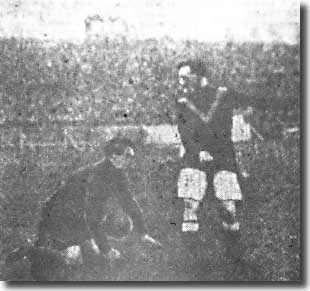 area,
but Fulham keeper McDonald showed good anticipation in saving
Sharpe's low spot kick.
area,
but Fulham keeper McDonald showed good anticipation in saving
Sharpe's low spot kick.
Fulham pulled one goal back in the 64th minute when Pearce beat
a number of City defenders before firing from distance past Hogg.
There were no further goals, though in the second half one marvellous
centre by Sharpe, fired in almost from the corner flag, grazed
the bar. City emerged victorious by two goals to one.
Colin reported for the Mercury, 'Leeds City fully deserved the
points. They were smarter, and had a far better conception of combination
forward than had Fulham ... McLeod was admirable in the first half, but
later seemed inclined to take matters easy. Price and Jackson had plenty
of opportunity to show their skill in the second half, and formed a useful,
if not brilliant, right wing. Price got in one or two spirited runs but
Jackson requires to infuse a little more dash into his efforts if his
wing is to be as penetrative as the other. We can, however, expect this
when he is better acquainted with his colleagues and his new surroundings.
The half-back line was, perhaps, the most consistently sound department
of the City team ... Law, Hampson and Foley were especially strong and
reliable, and also judicious in their feeding, the latter player being
one of the outstanding men on the field. Affleck and Foley so effectively
quelled the Fulham right wing that the full-back had time to materially
assist his colleagues. Hogg could hardly have been expected to save Pearce's
shot, but on the whole he had a quiet time.'
City captured second spot on Boxing Day when they won the return
at Fulham's Craven Cottage. McLeod got the only goal, heading
home a splendid Sharpe centre with nineteen minutes remaining.
The onfield battles with the Londoners also gave rise to some
conflict off the pitch.
City could not immediately pay Fulham their cut of the receipts
from the Christmas Day encounter, and the London club retaliated
by withholding money from the return game. The two clubs complained
to the Football League Management Committee which passed judgement
in February.
City reported that there had been a tram strike and that as a
consequence many supporters had been delayed. There were no police
to stop them rushing into the ground and as a result the club
had to take admission money on account. The Committee were satisfied
that City had acted in good faith and the club were let off with
a verbal warning for not taking money on the gate. Fulham were
ordered to pay the £20 4s 5d owed to City from the Boxing Day
gate, plus three guineas expenses.
According to the minutes of the meeting, 'The Committee desire it to
be known that while approving the course adopted by the Leeds City Club,
under the exceptional circumstances, they do not approve of money being
taken except through the regular and usual turnstiles and in the usual
manner. Any departure from this course must be regarded with suspicion
whether the gate is being pooled or not, and clubs in their own interests
as well as evidence of honesty ought not to be parties thereto.'
| |
Top of Division Two - 27 December 1913 |
| |
Pos
|
|
P
|
W
|
D
|
L
|
F
|
A
|
Pts
|
| |
1st
|
Hull
City |
20
|
11
|
6
|
3
|
38
|
14
|
28
|
| |
2nd
|
Notts
County |
22
|
11
|
6
|
5
|
43
|
22
|
28
|
| |
3rd
|
Woolwich
Arsenal |
20
|
12
|
4
|
4
|
30
|
20
|
28
|
| |
4th
|
Leeds
City |
19
|
12
|
3
|
4
|
43
|
20
|
27
|
| |
5th
|
Bradford
Park Avenue |
20
|
13
|
0
|
7
|
38
|
28
|
26
|
| |
6th
|
Wolverhampton
Wanderers |
20
|
10
|
4
|
6
|
24
|
22
|
24
|
| |
7th
|
Bury |
20
|
9
|
5
|
6
|
26
|
22
|
23
|
| |
8th
|
Fulham |
20
|
9
|
4
|
7
|
28
|
20
|
22
|
| |
|
|
|
|
|
|
|
|
|
The day after the Craven Cottage clash, City concluded their
holiday programme with a game at Glossop. The match was spoiled
by the conditions, with the pitch inches deep in mud, and a hailstorm
and stiff wind making for an unpleasant afternoon's work.
The Peacocks fell behind in the first half, but equalised around
the hour mark when Bainbridge accepted a short pass from Speirs
to drive the ball home.
Leeds had been expected to win, but in the end were grateful
to return home with a point following a Glossop performance that
made a mockery of their lowly ranking. City were disappointed
to slip to fourth, but they were only a point shy of Hull City,
Notts County and Woolwich Arsenal and had games in hand on all
three teams.
As the year ended, it was clear that City had their best chance
yet of securing the promotion that they coveted so jealously.
Part 2 Brink of glory - Results
and table
Other Football Highlights from 1913/14
- Following their first league title in 1912, Blackburn Rovers regained
the championship, finishing seven points clear of second placed Aston
Villa
- King George V became the first reigning monarch to see the
Cup final, when he presented the trophy at the Crystal Palace
to the winning captain, Burnley's centre half Tommy Boyle. England
international centre forward Freeman scored the only goal of
the game after 58 minutes against Liverpool to secure a first
Cup for Burnley. It was the fourth consecutive year that the
result was 1-0, although the first two of these finals both
needed replays
- Celtic returned to the fore in Scotland, securing another league and
Cup Double, after three years of seeing the league title go to Old Firm
rivals Rangers
- Ireland won the Home International Championship outright for the first
time. Billy Gillespie scored against England for the second year running
in a 3-0 win. England also lost to Wales and Scotland. This was the
first time England had lost all three home internationals in the same
season
back to top













 the season. Tony Hogg, George Affleck, Mick Foley and Billy McLeod
were links with earlier regimes, but the rest of the side were
Chapman signings. Fred Croot made a handful of appearances, but
he was forced to play second fiddle to Sharpe.
the season. Tony Hogg, George Affleck, Mick Foley and Billy McLeod
were links with earlier regimes, but the rest of the side were
Chapman signings. Fred Croot made a handful of appearances, but
he was forced to play second fiddle to Sharpe. points.
points. cleverness,
and genuine leadership, which brought triumph to his side.'
cleverness,
and genuine leadership, which brought triumph to his side.' Stephen
Studd: 'When Leeds City arrived for their meeting with the Gunners on
6 December 1913, the Highbury ground was still only half finished, and
a wooden stand on the east side, designed for 9,000 spectators, was still
being built. Chapman was particularly struck by the fact that the ground
was just across the road from Gillespie Road Underground station, and
could thus be reached easily from most parts of London. This observation
was to bear fruit in later years.'
Stephen
Studd: 'When Leeds City arrived for their meeting with the Gunners on
6 December 1913, the Highbury ground was still only half finished, and
a wooden stand on the east side, designed for 9,000 spectators, was still
being built. Chapman was particularly struck by the fact that the ground
was just across the road from Gillespie Road Underground station, and
could thus be reached easily from most parts of London. This observation
was to bear fruit in later years.' fine opportunities that were given them in front of goal. That was their
only fault, however, and it is seldom that such fine, open attacking is
so unsuccessful. There was no great attempt to combine by either line
of forwards ... Nothing tangible happened simply because the play of the
full-backs was of such a vigorous character that an incoming forward was
bundled off the ball without ceremony, and what they failed to accomplish,
the goalkeepers, Lievesley and Hogg, did in a convincing manner.
fine opportunities that were given them in front of goal. That was their
only fault, however, and it is seldom that such fine, open attacking is
so unsuccessful. There was no great attempt to combine by either line
of forwards ... Nothing tangible happened simply because the play of the
full-backs was of such a vigorous character that an incoming forward was
bundled off the ball without ceremony, and what they failed to accomplish,
the goalkeepers, Lievesley and Hogg, did in a convincing manner. fourth
goal to complete an emphatic victory.
fourth
goal to complete an emphatic victory. successful
schemer of the match, it will be pleasing to Sharpe's friends to know
that the goal which he scored was the crowning point of an excellent afternoon's
work.'
successful
schemer of the match, it will be pleasing to Sharpe's friends to know
that the goal which he scored was the crowning point of an excellent afternoon's
work.' area,
but Fulham keeper McDonald showed good anticipation in saving
Sharpe's low spot kick.
area,
but Fulham keeper McDonald showed good anticipation in saving
Sharpe's low spot kick.